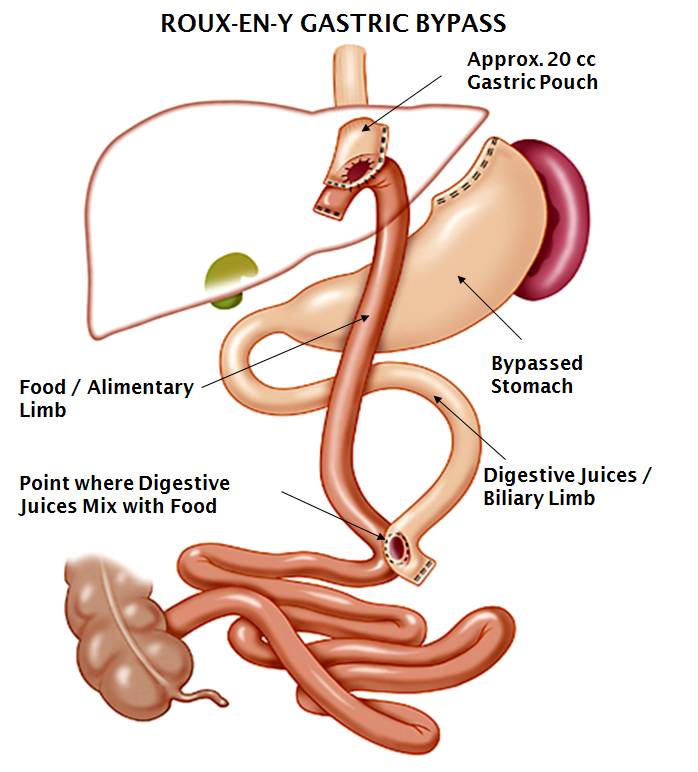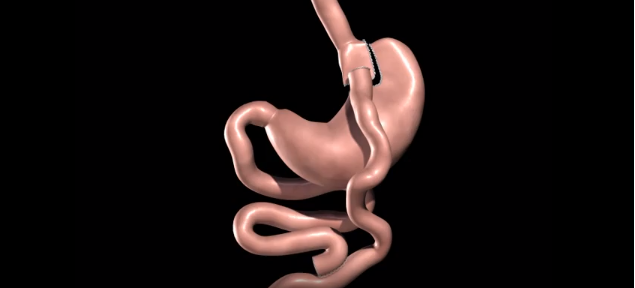Gastric Bypass Surgery Brisbane
Gastric Bypass Surgery is considered by the American Society of Bariatric and Metabolic Surgery (ASMBS) as “Gold Standard” in Laparoscopic Weight Loss Surgery
Gastric bypass surgery is a procedure performed for weight loss. Gastric bypass surgery is the most popular bariatric (obesity) surgery performed today.
After surgery, patients have a smaller usable section of stomach which makes weight loss easier, as they fill fuller from smaller meals.
The procedure was discovered after observing weight loss in patients undergoing partial stomach removal for ulcers. It has been regularly practiced for over 50 years since the 1960s.
Gastric bypass surgery typically results in weight loss of up to 70% of excess body weight.
Why Have Gastric Bypass Surgery?
The procedure is routinely named as the weight loss surgery of choice for many reasons, including:
- It is the most commonly performed weight loss surgery
- It provides outstanding weight loss results (superior to the Lap Band)
- It’s an excellent choice for those with a sweet tooth as it helps reduce sugar consumption
- It has been performed for the longest period of time, with the most amount of available data
When chronically obese celebrities Carnie Wilson, Al Roker and Star Jones decided to change their lives with surgical weight loss, the gastric bypass was their bariatric procedure of choice. More commonly referred to as gastric bypass surgery, it has been a trusted surgical weight loss procedure for more than 50 years.
It combines both restriction (reduction of the stomach volume or capacity) as well as malabsorption (bypass of the intestinal tract) to achieve up to 80% of excess weight loss in most individuals. The gastric bypass has been performed for a longer period of time and on more patients than any other surgery for weight loss. And with over 1500 successful weight loss surgeries, we perform gastric bypass surgery Brisbane and Australia wide.
To help prepare for this surgery, visit out Gastric Bypass Diet page.
Gastric Bypass Surgery Gets Results
After gastric bypass surgery, patients immediately benefit from a smaller stomach and less caloric absorption. They eat less food and consume fewer calories, and as a result, begin shedding excess kilograms. On average, patients who undergo the procedure experience >80% loss of excess weight and attain their goal weight within 12 to 18 months.

One of the key benefits of the gastric bypass is that it helps individuals who find it difficult to resist sweets and sugar to change their unhealthy eating habits through negative reinforcement. When a sweet or sugar is consumed after a gastric bypass, the patient feels sick from the rapid release of insulin and the uptake of fluid by the intestine which occurs, causing what is referred to as the “Dumping Syndrome”.
Symptoms of the Dumping Syndrome include nausea, diarrhoea, abdominal pain and heart palpitations. While not dangerous, these symptoms prove very useful in helping with behaviour modification and reduction of the consumption of sugar and sweet foods.
Gastric Bypass Surgery – How it Works
Gastric bypass surgery involves three main steps:
1. A new, smaller 15-25mL stomach (gastric pouch) is created by stapling shut the larger portion of your stomach, leaving the smaller pouch to collect the food you eat. This restricts the volume of food that can be consumed and the capacity of the stomach.
2. 135-150cm (or about 20%) of the small intestine (the duodenum) is bypassed, as well as the portion of the stomach that produces Ghrelin, the hormone that stimulates hunger. This results in a reduction of appetite
3. The gastric bypass essentially creates two channels in the intestinal tract – one for the food and a second for the digestive juices. The two channels are re-joined so that vitamins and protein can be adequately absorbed, but caloric absorption is reduced.
The Advantages of the Gastric Bypass Surgery Procedure
This weight loss surgery option has been proven to show remarkable results in overweight and obese patients, including:
Remarkable results:
- Estimated weight loss of up to 80% (superior to adjustable Gastric Band or Lap Band surgery)
- Resolution of diabetes in up to 90% of patients
- Resolution of obstructive sleep apnoea in up to 95% of patients
- Resolution of hyperlipidaemia (high cholesterol and triglycerides) for up to 80% of patients
- Resolution of hypertension in up to 75% of patients
- Ongoing sugar consumption is discouraged due to the Dumping Syndrome
- The intestinal bypass is minimal causing fewer malabsorptive complications than the duodenal switch
- Most commonly performed weight loss surgery in the world
- The laparoscopic approach is the standard method, which has a faster recovery, less pain and lower risk of infection than the open surgery method
Post-Op Dietary Plan: What To Expect
As with all surgical weight loss programs, it is imperative that gastric bypass patients adhere to dietary recommendations following surgery. This is both to minimise the post-operative problems that are encountered as well as to assure that nutritional requirements are met.
At Lap Surgery Brisbane, we offer a personalised and comprehensive aftercare program to assist you in every step of the way. Using a multi-disciplined approach with our surgeon, dietician, psychologist and exercise psychologist, we work closely with you to ensure your success.
While the overall plan involves a healthy “lean and green” strategy, we also commit to educating each patient in the long-term eating strategy that will lead to satiety and a defined sense of fullness, as well as how to minimise appetite.
Immediately following surgery, you will need to keep to a clear liquid diet for several days, followed by a diet of pureed foods. Drinking plenty of fluids during this time is very important, to ensure you are adequately hydrated.
Approximately one month after the gastric bypass surgery, you will begin to incorporate more regular foods into a transitional diet. During this period, it is fairly common to feel slightly ill and a decrease in energy levels as your body adapts to the changes in your diet as well as in your digestive system. However this is also the period when you can expect to experience the fastest weight loss, and some patients lose up to 5-7kg a month.
Six months after the procedure, you will adopt the long-term dietary plan put together for you by our team of health professionals. This will help you reach – and maintain – your goal weight, as well as avoid the possibility of regaining the lost weight.
Is Roux en Y Gastric Bypass Surgery for You?
The gastric bypass is a valid weight loss option if you are very obese and have not been able to lose weight through conventional methods of diet and exercise. To determine if you are a candidate for the procedure, Dr Braun will look at your Body Mass Index (BMI) as well as any health conditions you may have, such as type-2 diabetes or high blood pressure.
Candidacy decisions are made on a case-by-case basis. However, the surgery is generally recommended for individuals who have:
1. A BMI of 40 or more, or;
2. A BMI of 35 or more who also suffer from a serious medical condition related to obesity, such as type-2 diabetes, sleep apnoea, asthma or heart disease
It’s vital that you realise that gastric bypass surgery is not a quick fix for obesity, and is merely the first step in a complete lifestyle change. This includes following a strict dietary strategy to adapt healthy long-term eating habits and control portion sizes, as well as exercising regularly. If you do not follow the recommended measures after surgery, you may experience complications and limited weight loss results.
What Are The Risks of Gastric Bypass Surgery?
Like with all major surgery, the gastric bypass procedure comes with potential risks. However, with such a long history of success, there is a very low chance of these complications occurring. It’s very important that you thoroughly discuss these risks and any concerns you may have with your surgeon before going ahead with the surgery.
Potential complications for gastric bypass surgery include:
– Wound infections
– Gastritis (inflamed stomach lining), heartburn or stomach ulcers
– Internal hernias
– Blow-out of the stomach remnant
– Leaking from lines where the intestine is stapled together or to the stomach
– Small bowel obstruction
– Internal scarring
– Nutrient deficiencies
At Lap Surgery Brisbane, we take a number of preventative measures pre- and post-operation to avoid the possibility of these risks occurring, including a comprehensive assessment of your health, blood tests and medical tests, physical exams, nutritional counselling and a personalised long-term aftercare program to educate and monitor your weight loss journey.
Learn More About Gastric Bypass Surgery Brisbane
To gain a better understanding of your personal weight loss needs, please begin by using our BMI Calculator to determine your current Body Mass Index.
If you are interested in pursuing the gastric bypass or any of our other laparoscopic procedures or surgical weight loss solutions with the Wellness & Weight Loss Centre located in Brisbane North on Redcliffe Peninsula, please complete our on-line weight loss surgery registration form.
Lap Surgery Brisbane together with Weight & Metabolic Solutions Australia have proudly been performing successful weight loss surgery, including gastric bypass surgery Brisbane and Australia wide, to help patients all around the country reach their goal weight and go on to live healthy, fuller lives.
To schedule a surgical consultation with Dr Braun, please contact us or call direct on (07) 3353 9694.
